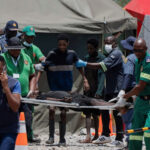Factional fighting within Zanu-PF has escalated, with party officials actively manoeuvring for power ahead of the next leadership cycle.
The conflict, primarily between President Emmerson Mnangagwa’s camp and that of Vice President Constantino Chiwenga, is fuelled by concerns over rampant corruption and a rapidly deteriorating economy, marked by the plummeting value of the Zimbabwean dollar against the US dollar. This economic crisis has ignited widespread public discontent, adding pressure to the already tense political landscape, New Zimbabwe has reported.
The internal strife within the ruling party was brought to light in a strongly worded letter from Zanu-PF national political commissar, Munyaradzi Machacha. Dated October 2nd, 2024, the letter, addressed to all provincial chairpersons, directly addresses the actions of District Coordinating Committees (DCCs), accusing them of fostering division and exceeding their constitutional mandates. The DCCs, grassroots structures with significant influence in presidential nominations at party congresses, are at the heart of the current power struggle.
Machacha’s letter outlines several key concerns. He accuses DCC members of attempting to usurp the role of “kingmakers,” a function previously associated with the now-dissolved DCCs that were disbanded for fuelling factionalism.
“The Politburo has observed with great concern the wayward behaviour of some members of the DCCs. The following issues have been observed…members of the DCC have resurrected the role previously played by the ‘old dissolved DCCs’ of becoming the King Makers,” the letter states.
Furthermore, Machacha criticises the DCCs for making executive decisions outside their purview, a violation of Article 13, Section 154 of the party constitution. This section explicitly states that “the DCC shall not make any executive description. All executive decisions shall be referred to the Provincial Executive Committee and Provincial Coordinating Committee.”
The letter also highlights instances where DCCs have sidelined certain members to consolidate their own power, contravening Article 13, Section 143, which details the broader membership of the DCC beyond elected members.
The letter details manipulative tactics employed by some DCC factions to exclude opposing members. Meetings are scheduled at times deliberately inconvenient for certain individuals, such as during weekdays when many are at work.
Machacha also condemns the premature campaigning for parliamentary and other positions, well before the official election season. “….disruptive behaviour by some members of the DCC, who are already on the ground campaigning for aspiring candidates and demonising sitting National Assembly members,” he writes.
“DCCs, therefore, be warned to desist from this reactionary conduct. Going forward, the party will take stern measures against perpetrators through severe disciplinary measures,” the letter concludes.
The current situation is reminiscent of the 2014-2015 period when DCCs were dissolved, ostensibly at the behest of then-Vice President Joice Mujuru. This move was interpreted by many as a strategic power play to shift influence away from Emmerson Mnangagwa, then a minister, and towards Mujuru, who was vying for the presidency.
However, political analysts argue that neither Mujuru nor Mnangagwa ultimately benefited from the DCC’s dissolution; the centralisation of power within the Presidium, Politburo, and Central Committee remained largely unaffected.
The reintroduction of DCCs in 2020, under the leadership of then-national commissariat secretary Victor Matemadanda, has evidently failed to prevent the resurgence of factionalism. The current crisis underscores the ongoing struggle for power within Zanu-PF and the significant influence of these grassroots structures in shaping the party’s future leadership.
Machacha’s strong warning signals a potential crackdown on those deemed to be undermining party unity and stability, but whether this will effectively quell the internal conflict remains to be seen. The stakes are high, with the future direction of the ruling party and the country hanging in the balance.











